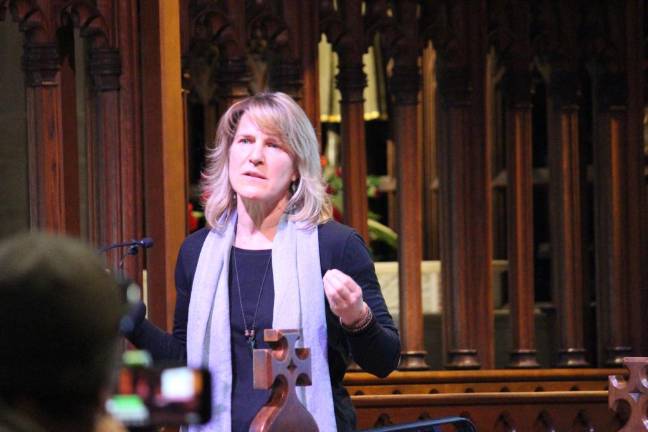She speaks for the Delaware
Giving the river a voice ‘in our human world’


Growing up, Maya K. van Rossum spent much of her time playing in a creek that fed into the Delaware River. “Whenever I saw a hurt piece of nature, a critter that was harmed, it was always heart wrenching,” she said. “I always wanted to fix it.”
Now, she uses her law degrees to do just that. Through her work as the Delaware Riverkeeper, van Rossum is responsible for protecting the entire length of the Delaware from the Catskill Mountains, through Pennsylvania and New Jersey, down to the Delaware Bay.
How did you get the Riverkeeper title? The universe took me here! I mean, ultimately, I actually had a very direct path. I went through college, I went through law school, I got two law degrees. And when I was looking to start my career I knew that I only wanted to advocate for nature. I wasn’t going to go work for government. I certainly wasn’t going to go work for a law firm or an industry under the farce that somehow I was going to make them be better environmentalists, that’s just a false narrative. I knew that I needed to come fight for the earth. And pretty quickly I got connected up with the American Littoral Society, the organization that helped found the Delaware Riverkeeper Network.
What does it mean to be Riverkeeper? My job is really to make sure that any time anybody anywhere within the watershed is going to make a decision that could help or harm the river, that the needs of the river are not just heard and understood, but are given the highest priority in the decision-making process. You know, the river is tributaries, the natural ecosystems of our watershed. They don’t have a voice in our human world, unless somebody gives them a voice.
We take on a wide variety of threats from fracking and pipelines and liquefied natural gas export facilities, to protecting the river from development in the floodplain that creates so much harm, to challenging dredging and deepening projects to fighting for special species. We’re working to make sure that people don’t try to ‘dip their straw’ in the river whenever they want to do a new development project.
Besides providing drinking water for millions, why is the river so important? The Delaware River is the backbone of every aspect of our lives here in the watershed. It supports $22 billion dollars of economic activity, whether you’re talking about recreation, and all the income and the jobs that are supported by fishing and boating and ecotourism, or industries like pharmaceutical companies who need clean water in order to make the product. The Delaware River provides the water we need not just for drinking but for supporting our life, for growing food, for everything we do as people, and that water needs to be clean, it needs to be healthy, it needs to be abundant.
What inspired you to become an environmentalist? So there’s a combination of me that really loved nature, and that very much believed, and still does believe, in the importance of justice. Being an environmental advocate was a way for me to blend the two together. I think the other part of my inspiration is my mother, who was not an environmental activist the way I am, but was very much a champion for the environment in terms of how she lived her life. My mom would ride her bicycle, and encouraged us kids to ride our bicycles – if you had to go to the shop to get a few things, or if we were going to see a friend – rather than ride in the car. When my mother would see people gathering up their leaves, putting them in trash bags and throwing the leaves out as if they were trash to be hauled off to the landfill, she would literally, day after day every fall, drive around and collect those bags and shove them in our VW van, and bring them home, empty those plastic bags, and put those leaves in a hole that she had dug so they could compost. And the plastic bags, she would fold them up so they could be used in a meaningful way, not to throw out bits of nature. And she always invited me to go along. Early on, when I was much younger, I would get embarrassed when the property owner would come out and see us picking their leaves... When I became an adult, I did the same thing and my daughter got trucked around with me.
What’s one thing the average person can do to help the environment? Whether they do it on their own property, or they encourage it on the property of the local school or municipal building: transform one scape into a native landscape with native flowering plants, shrubs and trees. Replacing lawn with native habitat is of incredible value to the environment, to our neighbors, to the critters with whom we share this earth and for ourselves.